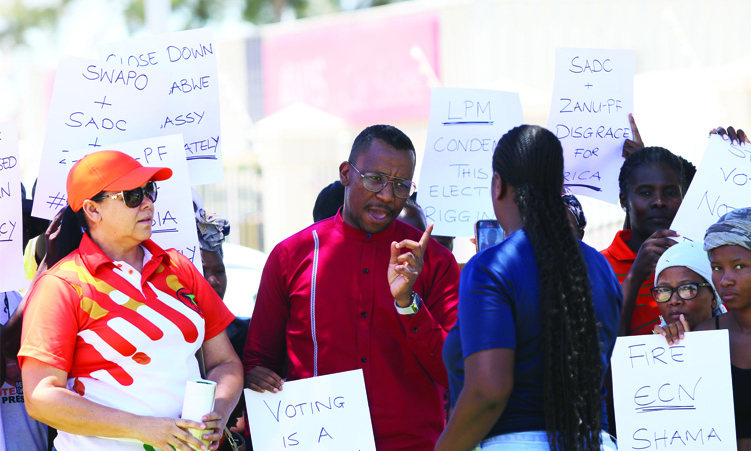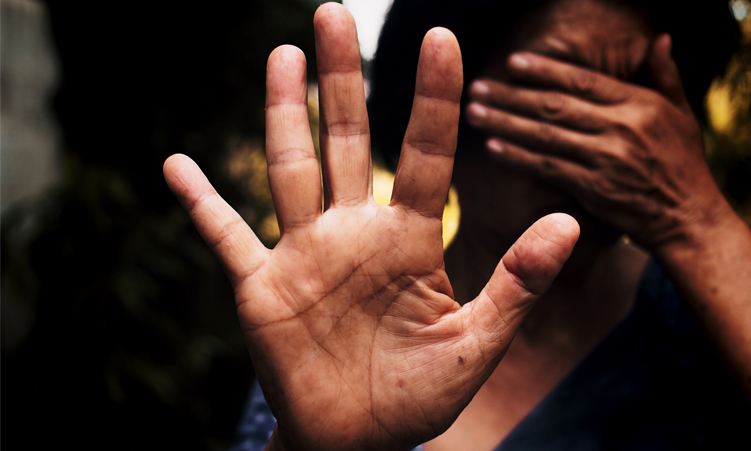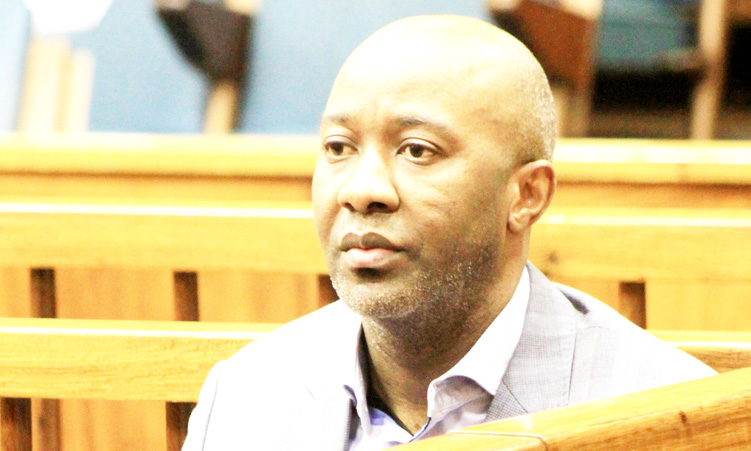The recently concluded national election has been described as a sham, failing to meet the credibility of being free and fair.
Both former ombudsman John Walters and current ombudsman Basilius Dyakugha have questioned the manner in which the Electoral Commission of Namibia (ECN) conducted last week’s elections.
Over 1.4 million Namibians registered to participate in Wednesday’s elections.
However, some could not cast their votes due to logistical issues. The voting was controversially extended into the weekend by the ECN due to shortages of ballot papers, a move challenged by opposition parties.
Walters yesterday told The Namibian the election was not fair because of the limitations of the extension.
“It was unfair in the sense that it was not open to all regions of the country,” he said.
He questioned the commission’s choice of polling stations for the extended voting days.
“Why and what was the criteria for selecting the polling stations? It is a concern for many,” he said.
“Others in other regions have been left behind,” Walters said.
He called out the ECN for subjecting Namibians to running to the bush to relieve themselves.
“There was a little bit of a challenge for them standing in the sun, in the heat and running quickly to the bush which is not close by,” he said.
Walters believes they should have provided temporary facilities for voters.
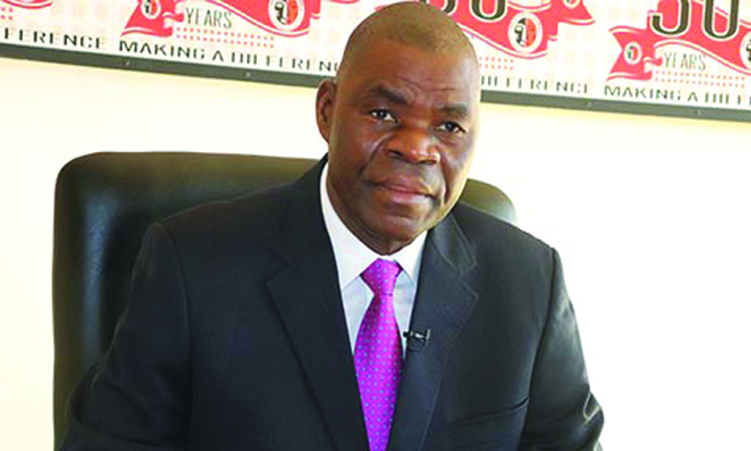
Dyakugha on Saturday said they want the commission to work around the issues of trust and credibility.
“They have not really done much to tell the public, whether what they are doing is actually within the confines of the law,” he said.
Dyakugha said what the law doesn’t prohibit, can be done.
“So, if it is in the Electoral Act, it is not prohibited for them to extend the elections for more than two days, which is actually very, very strange, because the people that voted on the 27th are more than the people that didn’t vote,” he said.
He emphasised that the ECN must clarify and communicate its legal position.
“If you look at what the electoral law says, it says after registering, people have to vote to count at the polling station,” he said.
The observer mission says the election fell short of the requirements of the Constitution, the Electoral Act, and the Southern African Development Community principles and guidelines governing democratic elections of 2021.
“The Southern Africa Human Rights Lawyers Election Observer Mission noted with concern that most of the polling stations observed during opening had no necessary election material and were not prepared enough to start voting,” their preliminary report states.
The lawyers point out that voters had to wait until they lost their patience and started protesting.
“We noted exclusive voter frustration resulting in voters leaving polling stations without casting their votes,” the report reads.
The report says there was a shortage of ballot papers at polling stations from as early as 11h00, despite claims by the ECN that they had printed an additional 400 000 ballot papers as a contingency.
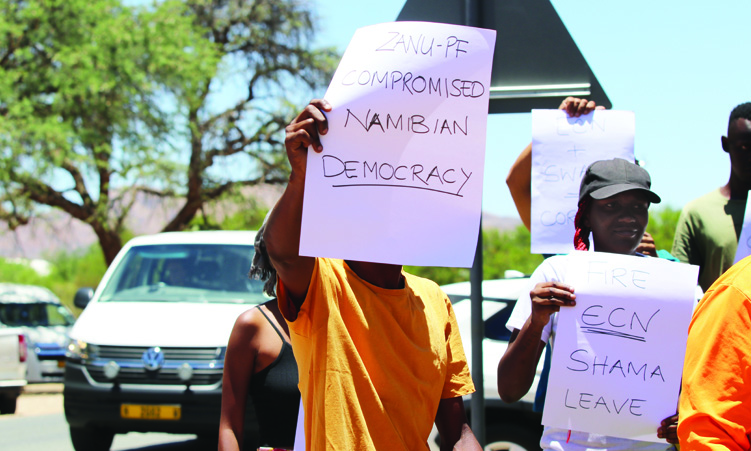
“The voting on 27 November 2024 was characterised by a lot of irregularities, violations of the Electoral Act, violation of the Constitution, deliberate voter frustration and exclusive operational lapses by the Electoral Commission of Namibia, such as shortages of ballot papers at polling stations, heating of tablets, running out of batteries for the torches and mobile polling stations forcing voters to leave without casting their votes,” the lawyers say.
They believe there were deliberate delays of voting processes in more than 63% of the total polling stations across the country.
“Citizens started voting around 09h15 to 09h40 and by around 11h30, there were shortages of ballot papers in about 38% of the total polling stations across the country,” the lawyers say.
Popular Democratic Movement president McHenry Venaani yesterday said his party rejects the “sham results”.
“The results are suppressed to suit one party’s agenda. Only a fool will validate such organised rubbish. We are in talks with other opposition parties to jointly launch a legal challenge,” he said.
National Unity Democratic Organisation parliamentarian Joseph Kauandenge yesterday posted on social media that if voters want to keep Swapo in power, elections must be above reproach, and Swapo must win it clearly, credibly and fairly.
“President of the Independent Patriots for Change (IPC), indeed you have my support to fight up to the highest court to declare this so-called election null and void,” Kauandenge wrote.
Landless People’s Movement leader Bernadus Swartbooi echoes the same sentiments.
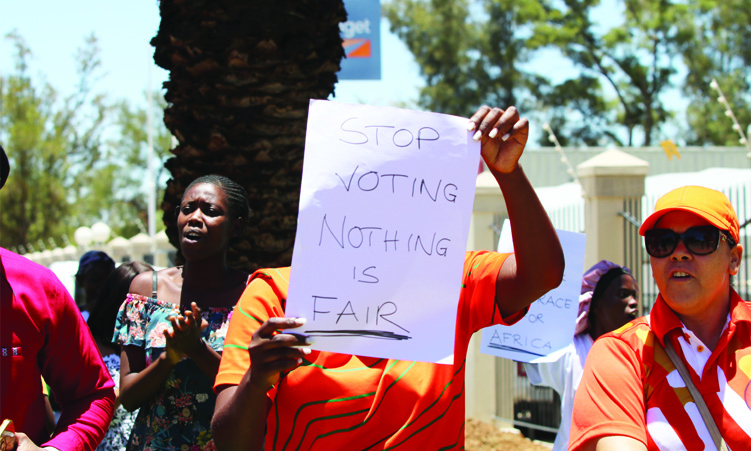
“The ECN plunged the process, together with the acting president, from one crisis into another deeper crisis,” he says. Swartbooi hints towards pursuing legal action after the results.
Swartbooi along with other opposition leaders on Saturday accused Zimbabwe’s ruling party, Zanu-PF, of rigging and influencing Namibia’s elections.
African Union Electoral Observation Mission head Speciosa Kazibwe says the ECN is causing confusion by opening more voting stations while counting has started at others.
The mission says the ECN should not have set up polling stations on private property.
She says long queues on Wednesday led to voters driving around looking for less busy polling stations.
“Voters were shopping for polling stations . . . I think something should be done about it,” she says.
IPC leader Panduleni Itula on Saturday accused the ECN of undermining the country’s democracy.
“We will not accept the results of these elections, whether they indicate a win for the IPC presidential candidate, victory in parliamentary seats or even suggest a run-off,” Itula said.
Political analyst Henning Melber says ECN officials should resign with immediate effect.
“The new ECN should then organise elections well enough ahead of 21 March to allow for a possible second round in presidential elections and the formation of a government.
“This seems in the current mess, the atmosphere of distrust and non-confidence, the only feasible way to regain legitimacy and credibility, not only for the ECN but for Namibian democracy and also the majority party and president then elected. What happened on and since 27 November has catastrophic proportions for a democratic culture and common ground among political competitors,” he says.
Stay informed with The Namibian – your source for credible journalism. Get in-depth reporting and opinions for
only N$85 a month. Invest in journalism, invest in democracy –
Subscribe Now!


